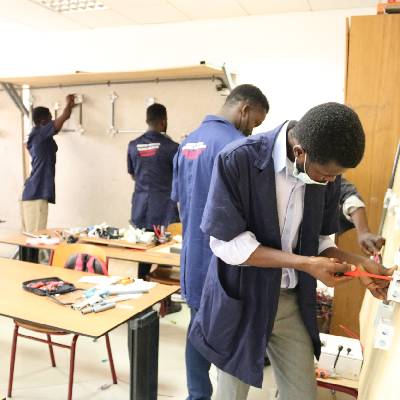
The Bachelor of Laws (LL.B.) degree prepares undergraduate students for careers in legal education in both private and public sectors.
This Bachelor of Laws (LL.B) degree provides students with a sound knowledge of the principles of the Kenyan, regional, and international legal systems. A Bachelor of Law graduate is empowered to critically assess, interpret and apply the law with a historical, comparative, and jurisprudential background that is essential for a thorough and critical understanding of the law and legal institutions.
At the completion of the LLB program, graduates will be able to:
- Apply legal theory, principles and rules in political, social and economic contexts;
- Demonstrate skills in legal research, logical argumentation, vigorous analysis of legal principles and courtroom techniques;
- Analyze the challenges facing Africa and the role of the legal profession in addressing them;
- Formulate and defend a robust and thoughtful code of professional conduct consistent with the guidelines of the profession and their religious and/or moral values system(s);
- Compare and evaluate the relative merits of different legal and policy arguments as articulated in case law and legal scholarship;
- Communicate effectively using appropriate legal terminologies and also be able to discuss legal materials statutes, cases, academic papers, court summaries which are written in legal technical language;
- Conduct effective legal research which contributes and enhances the legal knowledge base.
Entry Requirements
- Be a holder of a Kenya Certificate of Secondary Education (K.C.S.E.) with a mean grade of at least a C+ (C Plus) OR
- Be a holder of a Kenya Certificate of Secondary Education (K.C.S.E.) with a mean grade of C (C Plain) and a distinction or credit pass in a relevant diploma OR
- Be a holder of a Kenya Advanced Certificate of Education (K.A.C.E) with at least two principal passes (Principal A, B or C) OR
- Be a holder of a degree or degrees from a recognized University,
Note: The student must have at least grade B (B Plain) in English at Kenya Certificate of Secondary Education.
Objectives of Bachelor of Laws (LLB)
The Bachelor of Laws degree curriculum includes a skills component that teaches students generic practical skills such as problem-solving, analysis, research, and practical legal skills such as legal writing, drafting, and argumentation. Law students are required to make constructive use of the knowledge and skills they acquire by contributing to national development and the community through legal aid, community service, street law and similar outreach activities
The specific objectives are:
- To expose students to the multifaceted nature of the development process and arouse their intellectual and practical interest in the phenomena of nation-building, fidelity to the law and its institutions and so develop responsibility for the national heritage.
- To introduce students to the social foundations and perspectives of the law.
- To inculcate in students sufficient technical skills for the extraction and communication of legal information to make their intellectual and professional lives exciting and fulfilling.
- To introduce students to the international legal order, its various manifestations, and relationships with the municipal legal systems.
- To deepen the students' appreciation of the theory and substance of the law and its application to contemporary problems.
- To prepare students with the knowledge, skills, and other competencies to enable them to provide legal services nationally, regionally, and globally.
- To intellectually prepare students to appreciate the role of law in development from national, regional, and international perspectives.
- To Inculcate in students the values of professionalism, social justice, and community service.
- To Integrate studies in science and technology, including information technology, in legal education.
- To promote the stated goals, vision, mission, and philosophy of JKUAT.
- To deepen the understanding of national and international law, and how both regimes relate to each other.
- To provide students with legal knowledge and skills relevant in the fields of Agriculture, Engineering, Technology, Enterprise Development, Built Environment, Health Sciences, and other Applied Sciences.
What you will study
Year 1 Semester 1
- Legal Research and Writing
- Criminal Law
- Constitutional Law
- Legal Systems and Methods
- Law of Contracts
- Social Foundations of Law
- Introduction to International and Development Law
Year 1 Semester 2
- Law of Torts
- Equity and the Law of Trusts
- Administrative Law
- Law of Evidence I
- Property Law 1
- Introduction to Forced Migration Law
- Development Studies
Year 2, Semester 1
- Commercial Law
- Public International Law
- Law of Evidence II
- Law & Democracy
- Criminal Procedure
- Law and Development
- Information Communication and Technology Law
Year 2, Semester 2
- Labour Law
- Law of Business Association
- Property Law II
- International Human Rights Law
- Criminology and Penology
- Civil Procedure
- Medical Law and Ethics
Year 3, Semester 1
- Family Law
- Jurisprudence
- Company Law
- Private International Law
- International Criminal Law
- International Refugee Law
Elective Units (Elect 1)
- International Humanitarian Law
- Competition Law
Year 3, Semester 2
- Law of Succession
- Law of Insolvency
- International Trade Law
- International Economic Law
- Gender and the Law
- International Environmental Law
- Judicial Attachment
Elective Units (Elect 1)
- Consumer Protection Law
- International Corporate Governance Law
Year 4, Semester 1
- Dissertation Proposal Writing
- Law and Security
- Children and the Law
- Practical Legal Clinics
- Maritime Law
Elective Units (Elect 1)
- Alternative Dispute Resolution
- Regional Integration Law
Year 4, Semester 2
- Dissertation Writing
- International Tax Law
- Global Justice and Development
- Intellectual Property Law
Elective Units (Elect 1)
- International Monetary Policy and Financial Regulation
- Law and Minority Groups Rights
Related articles
-

A Guide to Civil Engineering Degree and Diploma Programs in Kenya
08-Nov-2025 -

Electrical Engineering in Kenya: A 2025 Guide for KCSE Graduates
08-Nov-2025 -

Mechanical Engineering in Kenya: A 2025 Guide for KCSE Graduates
08-Nov-2025 -

Engineering Courses in Kenya: A Guide for 2025 KCSE Graduates
08-Nov-2025 -

Education Pathways in Kenya — From Basic Education to Tertiary | College Guide
06-Nov-2025 -

The Bird and the Mirror: A Reflection on Identity, Perception, and Illusion
07-Feb-2025
Colleges offering Bachelor of Laws (LLB)

Starehe
University of Nairobi

Ruiru
Kenyatta University

Dagoretti South
Africa Nazarene University

Dagoretti South
Africa Nazarene University

Rongai
Kabarak University

Langata
Riara University

Nyaribari Chache
Kisii University

Runyenjes
University of Embu

Machakos Town
Daystar University

Thika Town
